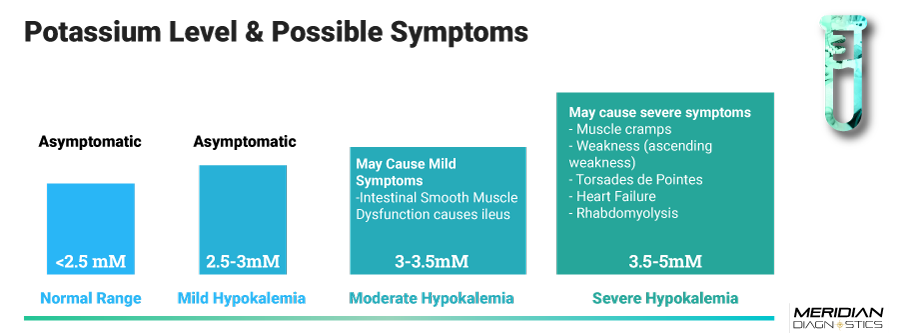High Potassium Levels in a Blood Test
Image from Abbott ci4100 Tour Footage
Potassium blood tests measure the amount of potassium in your blood. Potassium is an electrolyte, an electrically charged mineral in your body. Electrolytes are responsible for aiding muscle control and nerve activity, maintaining fluid levels, and performing other essential functions in cellular activity. You need the right amount of potassium in your body, so your heart and muscles work properly.
A potassium test can determine too low or too high levels, which could indicate an underlying medical problem. Providing reliable potassium level testing can help healthcare providers give the best care to their clients.
Why is Finding High Potassium Levels Important?
Potassium blood tests are typically part of a routine blood panel called the electrolyte panel. These may be used to diagnose high blood pressure, heart disease, and kidney disease, or to monitor chronic health conditions.
Testing for high potassium levels can help medical providers check for an electrolyte imbalance to narrow down a particular diagnosis. Potassium tests may check for metabolic acidosis, a higher level than normal of acid in the body. This can happen when the kidneys don't remove enough acid from the body or when someone may not be managing their diabetes properly. Another reason that a doctor may order potassium testing is to determine the causes of a paralysis attack.
Potassium testing is also used as part of monitoring medication that can affect your body's potassium levels, such as heart and high blood pressure medications and diuretics. And, potassium testing can help diagnose alkalosis, which is a condition when body fluids have higher than normal levels of alkali.

What Does High Potassium Mean For Your Health?
High potassium is measured in millimoles per liter. A potassium level of more than 7.0 millimoles per liter can be life-threatening. You may be directed to seek immediate medical attention if your results are this high.
High potassium levels can also indicate that you have a particular disease or health condition. It could indicate that you're taking in too much potassium in your diet, either through your food choices, supplements, or both. Or, the levels could be due to taking certain medications, such as beta-blockers, nonsteroidal anti-inflammatory drugs, diuretics, angiotensin II receptor blockers, or ACE enzyme inhibitors.
Sometimes, you can have elevated potassium levels after a blood transfusion if you suffer from dehydration or an infection. A tissue injury that causes the breakdown of muscle fibers can release excess potassium into the blood, as can the destruction of red blood cells after a burn or other serious injury.
High potassium levels may indicate a person has an underlying medical condition such as:
- Type 1 diabetes
- Respiratory acidosis
- Metabolic acidosis
- Kidney failure
- Addison's disease
- Hypoaldosteronism
Potassium testing helps doctors properly diagnose conditions in their patients.
What To Do If You've Received a High Potassium Diagnosis?
A doctor will go over your potassium levels and how to help lower them. They may use your medical history to develop a treatment plan that not only addresses the high potassium levels but also manages an underlying health condition that caused it. If the high potassium levels are caused by medications you're taking, the doctor may have you change to a different type of medicine.
Sometimes, potassium levels can be lowered by following a diet of foods low in potassium and avoiding those with high potassium levels. You may have to cut out certain foods, too, including alcohol and caffeine.
Left untreated, high potassium levels can significantly impact a person's health. For example, complications stemming from chronic high potassium include:
- Chronic weakness and fatigue
- Arrhythmia, or irregular heartbeat
- Heart attack
- Cardiac arrest, which may be fatal
Managing high potassium and following your treatment plan can help you avoid severe complications from high potassium.
Meridian Diagnostic Can Provide Information For You
Sometimes, potassium testing can result in a false positive. This makes it more challenging for a physician to give the right diagnosis for a patient. False positives can result in misdiagnosis, so it's best to have a high-quality diagnostic lab perform potassium testing. Some people may not exhibit symptoms right away, but may be in a risk category for high potassium, such as those who are taking certain medications or have an underlying condition.
Meridian Diagnostic is a fast, accurate, and safe laboratory that provides reliable and consistent test analyses for medical care providers and hospitals, helping their patients enjoy better health


